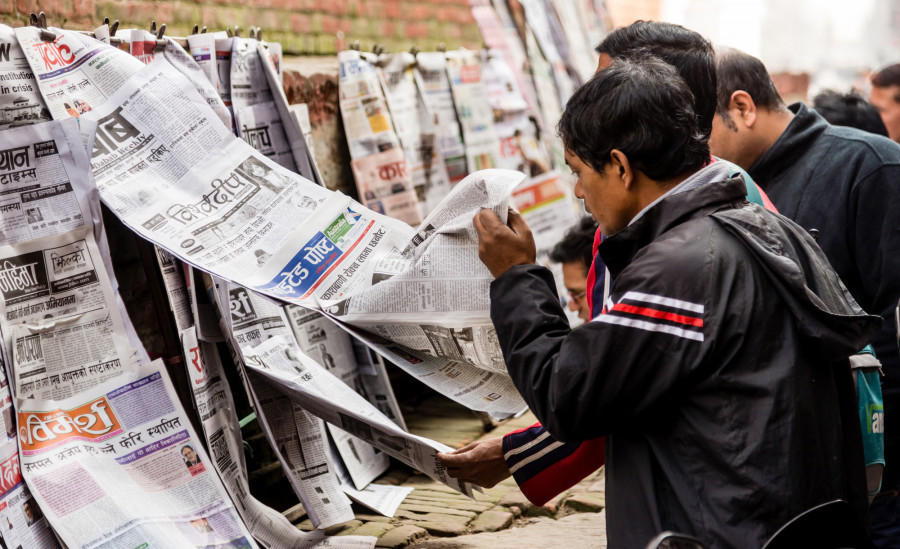Columns
Nepali media and the message
Seeking to give a cogent picture of the chaos has become the media’s responsibility.
Abhi Subedi
I was struck by the intensity and energy of the discussion on the media at a colloquium organised by well-known writer and journalist Kishore Nepal on July 11. The participants were well-known journalists and media karmis from major media houses. They put forth their views on what appeared to be a little anarchic topic: "How do we survive? Status of journalism, literature and social media in Nepali society".
What impressed me was the eloquent presentation of the media karmis about the present state of Nepali media, which is a mix of enthusiasm and worries. They spoke about the sway of social media and the power of a culture that is changing the entire media pattern. It was surprising for me to hear that you are hunted and attacked in terrible language if you slightly critique the actions of your favourite characters.
It was also stunning to hear the following. There is no dearth of resources and money in journalism, but the journalists sincerely engaging in it lack them. Journalists face threats from other journalists. Social media has become an outlet, a system of purgation. The journalists said fewer people were interested in reading broadsheet papers. As a reader of both broadsheets and online news and views, I found myself in a unique situation.
Alternate system
The question that strikes me is this: Has the media already become an alternate system in Nepal? Here, I would like to allude to the book of the famous British journalist and editor of The Financial Times, John Lloyd, entitled What the Media Are Doing to Our Politics (2004). Lloyd sees that the media has ceased to function as an instrument of checking the “excesses of the political class”. He believes that they have instead become an alternative establishment founded on the distrust of politicians. I also put a caveat in the discussion.
As a student of linguistics and literature, I have found an anarchic trend in the use of language in politics over the last several years. The use of vituperative language by politicians against each other has become a common practice in Nepal. Using indecent amaryadit language in politics has sadly become a norm here. How did that happen? Some serious discussions by linguists and literary writers may be required to understand that. But what can be assumed is that it has happened because the leaders and their cronies have made political parties just a means of achieving their personal ambitions. What is happening in social media is a result of the problematic culture of language use.
We have seen that the sphere of the media is widening. For this reason, it has become a challenge and responsibility for the media itself to manage the expanding sphere. A kind of binary between the media and political parties—their alliances, their governments and the oppositions—has evolved. That is perhaps a universal feature, but in Nepal, it has become an important phenomenon. Reporting and seeking to give a cogent picture of the chaos has become the responsibility of the media people. We must say some portals are accomplishing this quite well.
One way to keep this culture, I think, is to maintain the distinct identities of the actors. Impersonality rather than an emotionally guided personal approach is better. But a surfeit of personally guided, selfish practices has a strong grip on the language of politics. It has affected the media. A culture of creating heroes and topics and using irresponsible language to characterise them is burgeoning. We ask: Do we want to see the rise of a few strongmen? How do we assess our intentions? Clearly, the answer is difficult.
The other subject that media analysts have been raising is the fragile state of morality, especially propelled by issues like the Bhutanese scam and other scandals involving money.
How would a literary person address the subject? Literary writings tend to involve feelings and emotions. Character creation is an important fact of literary writing. We should distinguish between literary characters and the populist, wealth-savvy individuals who can be found easily in society these days. A quest for character is a feature of literary writing. Using language in a certain way has become an important factor in Nepali political and media discourses. The spaces for the use of language are Parliament and political forums.
Backward slide
Emotional use of language is made in the wrong places—open forums, newspapers, books and social media. Does such use of anarchic language show a backward slide in our democratic political system? I strongly believe that it is not the case. Though some people evoke, as the French philosopher Jacques Derrida says, the “spectres” or pret of history in the form of characters from defunct political systems, the present state of the political system and media are forward-looking and democratic in nature.
That was a small but very meaningful colloquium. In my presentation, I recalled my own orientation to the important media discussion of the late 1960s when there was the autocratic Panchayat system in Nepal. As a youth shaped by the multiple influences of Marx and the hippies, I saw the power in the dictum of the Canadian media pundit Marshal McLuhan—the medium is the message. He included visual, print and music mediums in his definition of the message system. The electronic communication devices available then were radio, television, computers and films. The same means are in use today. McLuhan saw a message in the medium itself. I recalled McLuhan's vision at the discussions about the burden of the message at the colloquium of the media and literary writers.




 13.12°C Kathmandu
13.12°C Kathmandu















